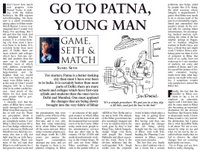In last six days, I have lambasted two articles published in Business Standard. So it comes as a surprise to find a constructive and positive one in today's Business Standard. Kudos to the author, Aditi Phadnis for bringing out the reality after excellent research on the ground. Her artcile - His new republic of Bihar - is indeed one of the best pieces of constructive journalism that I have recently come across. It's vivid, it's real, it's palpable! [Just noticed that Business Standard for some God-forsaken reason has removed the article from their site. So if you are unale to see the full article on Business Standard, you may read it HERE]
The best thing about this article is that it encompasses a wide range of issues and how the new government is dealing with them. This article is a comprehensive analysis of how things are turning for the better in Bihar.
Some examples that may startle many people who have been wholesomely fed with stereotyping of Bihar by media: Marriage of social welfare and technology A young woman tugs at a security official’s sleeve. “I don’t have a petition,” she says, on the verge of hysterical tears. “I paid Re 1 to someone to write out my petition but he took my money and walked off.”
An officer is summoned and an application is written on her behalf. This will be entered in a data base designed by Tata Consultancy Services to enable the CM’s secretariat to track the complaint and redress it if the district administration doesn’t act on it.
Police reforms - an excellent example Once the police understood that criminals were going to get no political protection, they decided to go after them. The Arms Act is beautiful in its simplicity.
...The criminals were chargesheeted in three days, brought before a fast track trial court and convicted even before they could ask for bail.
...Says principal secretary to the chief minister, R C P Singh: “Last month we logged 27 convictions a day. Of these, eight per day were for life imprisonment. In September we expect this to go up. In the last eight months we have convicted around 3,000 people in cases of heinous crime — murder, kidnapping and murder — and 2,000 people have been convicted in other crimes.”
...It has already recruited 5,000 retired soldiers who have been banded as the Special Auxiliary Police for constabulary and cordon and search operations.
Industry - preparing a conducive environment ...A Single Window Act, 2006 seeks to cut red tape for industry wanting to invest in the state.
...There are new rules for infrastructure development, the Rent Control Act has been abolished, stamp duty has been cut for better compliance, the Agricultural Produce Marketing Control Act used to force farmers to sell only at designated mandis has been abolished, the power sector has been unbundled into eight new entities, Bihar has a new sugarcane policy...
...“Bihar is going to spend Rs 17,000 crore over three years just on roads. Apart from unbundling the power sector, we are going to franchise distribution,” says N K Singh, newly appointed vice chairman of the state’s Investment Board.
Basic amenities - a priority ...In the last eight months, Rs 222 crore has already been spent on the health sector and the outlay in next year’s budget could be Rs 400 crore (it used to be Rs 100 crore before 2005).
World Bank economist's view: “In principal, Bihar should be growing twice as fast as the the national average if the government continues its reforms process. That’s the potential of the state,” says Dipak Dasgupta.
Intentions are good, actions are taking place, future is Bihar. What the esteemed junta feels? |

